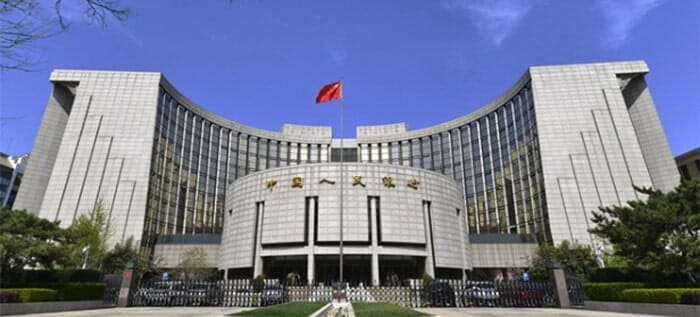
China’s PBOC has been injecting liquidity this year
After loosening the financial reins to boost an economy pummelled by the Covid-19 crisis in February this year, the Chinese government appears to be rolling out new measures to clamp down on flows of capital into the country’s now surging real estate market.
On Sunday morning the China’s central bank, together with the ministry primarily responsible for regulating the real estate sector, jointly announced that they had finished a round of consultation with representatives of some of the country’s real estate companies about developing a system for monitoring the health of property enterprises and setting up financial management rules for the sector.
While the announcement by the People’s Bank of China and the Ministry of Housing and Urban-Rural Development (MOHURD) did not lay out specific guidelines local press reports indicate that rules may be on the way that cap borrowing by highly indebted firms at the levels they reported in mid-2019.
The new rules are understood to be aimed at controlling financial risks after mainland developers issued RMB 26.1 billion in new bonds this year and total investment in the sector grew by a one-year high of 11.7 percent in July compared to the same month in 2019.
Four Tiers and Three Red Lines
Sunday’s announcement came after the PBOC and MOHURD met with developer representatives on 20 August to lay out a proposal to divide real estate enterprises into four tiers, divided by three “red lines” based on their debt to asset ratios, excluding advance revenue on sales.

Yi Gang’s team at the PBOC may be tired of seeing all their cash go into real estate. Image: Wikimedia Commons
The first red line is a debt-to-asset ratio of over 70 percent, the second red line is at a ratio of 100 percent and the third line demarcates companies where the cash to short term debt ratio is less than 1.0 times.
Companies that exceed the third red line are placed into the “red tier”, while those passing the second line are in the orange tier and enterprises that cross the first marker are in the yellow tier. Firms which keep their debt-to-asset ratios below all the lines are classified in the green tier.
Much like China’s colour codes for health dictated where its citizens which citizens were allowed out and about during the Covid-19 lockdown at the beginning of the year, the debt tiers are understood to control which firms will be allowed access to new financing.
A report in China’s 21st Century Business Herald, citing reports by real estate executives which had attended the sessions with regulators, said that companies in the red tier will see their debt levels capped at the level they reported on 30 June 2019, and will be denied access to further credit.
Companies in the orange tier will be allowed to expand their borrowings at a maximum of rate of 10 percent annually, while those in the yellow zone will see growth in the scale of their debts capped at 15 percent each year.
Liquidity Flows into Real Estate
The moves by mainland regulators can be seen as the latest attempt to direct liquidity away from the real estate sector, and into other businesses, as they struggle to reignite China’s economy.
Trades of property projects in mainland China reached $8.37 billion during the second quarter of 2020, which is an increase of 95 percent over the same period last year, according to statistics from Real Capital Analytics.
That flow of cash into offices, malls and warehouses came after the PBOC in early February injected RMB 1.2 trillion ($174 billion) into China’s financial markets to prop up an economy battered by the pandemic.
In June, the central bank followed up with another RMB 80 billion, according to a statement at the time, with the injection intended to ensure adequate liquidity in the banking system.
The government cash has quickly found its way into the housing market with real estate sales rising for the fifth consecutive month in July after bottoming out during the lockdown during the first two months of the year.
That increase in home sales has inspired fresh competition for land among developers and rising prices for prime site
Shanghai saw total revenues from land sales in 2020 rise to nearly double the amount raised in the first half of 2019, with multiple sites being sold at more than 30 percent above the auction minimum.
Nationwide, real estate companies in China spent RMB 538.2 billion acquiring new land from January through July this year, an increase of 12.2 percent compared to the same period in 2019, according to the National Bureau of Statistics.
To fuel all of those land purchases, China’s developers have been taking on more debt. During the first seven months of 2020 mainland developers issued domestic and overseas bonds totalling around RMB 737.9 billion, which is equal to 62.5 percent of last year’s total, according to the research division of property website Beike.
In July, Chinese real estate enterprises conducted some 109 domestic or foreign bond issues worth approximately RMB 123.4 billion, which constitutes a year-on-year increase of 6 percent.
Leave a Reply